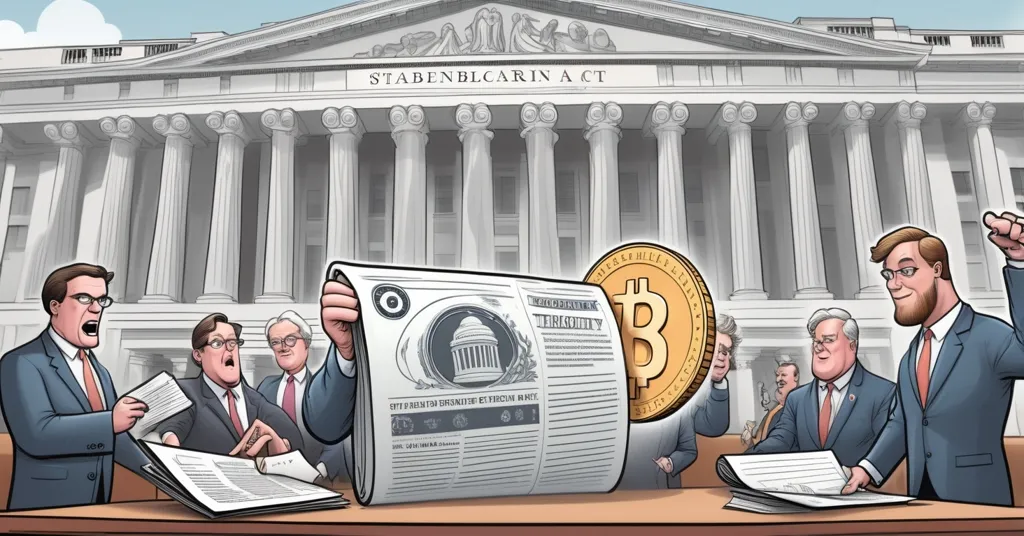White House Crypto Advisor: Stablecoin Regulation Could Boost U.S. Debt by Trillions

White House Crypto Czar David Sacks: Stablecoin Clarity Could Trigger Trillions for U.S. Debt
David Sacks, President Trump’s advisor on crypto and AI, suggests that the passage of the GENIUS Act, a bill aimed at regulating stablecoins, could lead to a significant demand for U.S. Treasuries, potentially injecting trillions into the U.S. debt market.
- GENIUS Act aims to regulate stablecoins, driving demand for U.S. Treasuries
- Strong bipartisan Senate support
- Trump family’s crypto ties raise concerns
- Possible delays due to proposed amendments
Stablecoins, digital currencies designed to maintain a stable value by being pegged to assets like the U.S. dollar or U.S. Treasuries (government debt securities), are at the heart of the GENIUS Act, officially known as the Guiding and Establishing National Innovation for U.S. Stablecoins Act. This legislation recently passed a key Senate hurdle with 66 votes, including 15 from Democrats, indicating robust bipartisan support.
David Sacks, the White House’s advisor on cryptocurrency and AI, has been vocal about the potential economic impact of this regulatory move. In a recent statement, Sacks asserted that the GENIUS Act could lead to “trillions of dollars of demand for our Treasuries practically overnight, very quickly.” This bold claim is rooted in the fact that the stablecoin market currently exceeds $200 billion, and under regulation, could drive significant demand for U.S. Treasuries, which are often used as backing for these digital assets.
However, the optimism surrounding the GENIUS Act is not without its shadows. The Trump family’s involvement in the cryptocurrency sector, notably through their support of World Liberty Financial, which launched USD1—a stablecoin backed by U.S. Treasuries and dollar deposits—has sparked concerns about potential conflicts of interest. Critics argue that the family’s ties to crypto ventures, including a recent $2 billion investment from Abu Dhabi’s MGX fund in USD1 on Binance (a platform that settled for violating anti-money laundering laws), could compromise the integrity of the legislation.
Despite these concerns, Sacks remains bullish on the economic benefits stablecoins could bring. He envisions them as offering “a new, more efficient, cheaper, smoother payment system—new payment rails for the U.S. economy.” This vision of a more streamlined financial system underpins the push for the GENIUS Act, though potential amendments, such as one by Sen. Josh Hawley to cap credit card late fees, could delay its passage by creating friction with banking groups.
The global context for this legislation is also significant. Hong Kong’s recent passage of similar laws to regulate stablecoins signals a worldwide trend towards integrating digital assets into financial systems. This global push underscores the urgency for the U.S. to stay competitive in the financial landscape.
Yet, the path to stablecoin regulation is fraught with political complexities. Democrats have previously rejected the GENIUS Act due to concerns about insufficient safeguards to prevent the president and his family from profiting from the legislation. Sen. Jeff Merkley’s support for the End Crypto Corruption Act, which seeks to ban presidents and senior officials from profiting off crypto ventures, highlights this tension. Additionally, within the Republican party, Rep. French Hill has expressed frustration over the Trump family’s involvement in the memecoin space, suggesting it distracts from the legislative process.
The potential for U.S. banks like JPMorgan, Bank of America, and Citi to issue a unified digital dollar contingent on the GENIUS Act’s passage adds a competitive angle. This initiative could position the U.S. to rival foreign-controlled stablecoins like Tether, which currently dominates over 60% of the stablecoin market and saw transactions last year surpass those of Mastercard and Visa combined.
As the debate over the GENIUS Act continues, the stakes are high. The promise of a new payment system and a surge in demand for U.S. Treasuries is enticing, but the political complexities and potential delays cannot be overlooked. In the dynamic world of crypto, where innovation and regulation often collide, the outcome of this legislative battle could have profound implications for the future of finance in the U.S. and beyond.
While the GENIUS Act focuses on stablecoins, it’s worth noting how such legislation might affect Bitcoin and other cryptocurrencies. Bitcoin, as the pioneer of decentralized digital currency, often benefits from regulatory clarity that enhances the overall crypto ecosystem. Altcoins and other blockchains, like Ethereum, also play critical roles in this financial revolution, filling niches that Bitcoin might not serve as effectively. This legislative move aligns with the principles of effective accelerationism, pushing for rapid technological and financial innovation.
Key takeaways and questions:
- What is the GENIUS Act and its purpose?
The GENIUS Act, or Guiding and Establishing National Innovation for U.S. Stablecoins Act, aims to create a federal framework for regulating stablecoins, integrating them into the U.S. financial system to enhance payment efficiency and drive demand for U.S. Treasuries.
- How could stablecoin regulation impact U.S. Treasuries?
David Sacks suggests that regulating stablecoins could lead to a surge in demand for U.S. Treasuries, as these digital currencies often use Treasuries as backing, potentially injecting trillions into the U.S. debt market.
- What are the potential economic benefits of stablecoins according to David Sacks?
Sacks believes stablecoins could revolutionize the U.S. payment system by offering a more efficient, cheaper, and smoother method of transactions, creating new payment rails that could boost the economy.
- What concerns are raised regarding the Trump family’s involvement in crypto?
Critics are concerned about potential conflicts of interest due to the Trump family’s backing of World Liberty Financial, which launched USD1, a stablecoin linked to significant investments and associated with Binance, a platform that admitted to violating U.S. laws.
- What could delay the final passage of the GENIUS Act?
An amendment proposed by Sen. Josh Hawley to cap credit card late fees might create friction with banking groups, potentially delaying the bill’s final passage.



